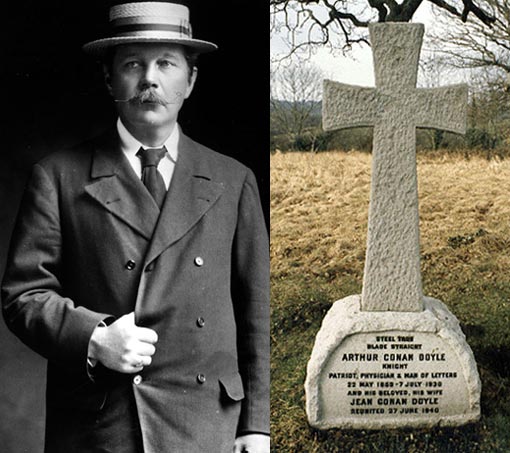You are hereBlogs / WcP.Story.Teller's blog / Even in DNA age we still believe in Sherlock Holmes, world's most celebrated detective created by Arthur Conan Doyle
Even in DNA age we still believe in Sherlock Holmes, world's most celebrated detective created by Arthur Conan Doyle

(quote)
Last weekend saw the 150th anniversary of the birth of Arthur Conan Doyle, the creator of the world's most celebrated fictional detective. So what's kept him at the top for 122 years?
In 1887, appearing in print for the first time, Sherlock Holmes set out his purpose in life. The declaration in "A Study in Scarlet" would also come to dictate much of the subsequent career of Holmes' creator, Arthur Conan Doyle - not always to his pleasure. "There's the scarlet thread of murder running through the colorless skein of life, and our duty is to unravel it." He went on to define the archetype of the brilliant but troubled detective. Even today the character of Holmes defines what we expect of great fictional detectives. We want them to accept that "duty" to do good - but also to be personally flawed.

The 28 year-old author wasn't the first to spot the narrative potential of an incisive but troubled detective. Conan Doyle himself acknowledged the influence of Edgar Allan Poe's Auguste Dupin and of Lecoq, created by the now largely forgotten Emile Gaboriau. But almost every fictional detective stands in Holmes' shadow - from Kurt Wallander back to Raymond Chandler's Philip Marlowe. Chandler once wrote: "Sherlock Holmes is mostly an attitude and a few dozen lines of unforgettable dialogue." This may or may not have been a compliment.
The Holmes phenomenon really took off in 1891 when he transferred to the just-launched Strand magazine. In modern media-speak it was the perfect match of platform and content. Conan Doyle realized reading habits were changing as an expanding middle class enjoyed greater leisure. But the main demand was for short fiction, to be read in a single sitting or even on a train. Daniel Stashower, a US biographer, says Conan Doyle spotted a new hunger for continuing fiction in which main characters carry over from one story to the next but which could be read in any order. "It didn't much matter if you missed an installment - like a TV mini-series today," he explains.

The first Hollywood Holmes appeared as early as 1916 and there had already been German and French adaptations. Out later this year is the new Guy Ritchie movie, with Robert Downey Jr. as Holmes and Jude Law as Watson. Hollywood's betting that almost a century after the character was first on screen Holmes remains box-office.
Conan Doyle was also a fervent advocate of justice and personally investigated two closed cases, which led to two men being exonerated of the crimes they were accused of. The first case, in 1906, involved a shy half-British, half-Indian lawyer named George Edalji, who had allegedly penned threatening letters and mutilated animals. Police were set on Edalji's conviction, even though the mutilations continued after their suspect was jailed. It was partially as a result of this case that the Court of Criminal Appeal was established in 1907, so not only did Conan Doyle help George Edalji, his work helped establish a way to correct other miscarriages of justice. The story of Conan Doyle and Edalji is told in fictional form in Julian Barnes' 2005 novel, Arthur & George.
(unquote)
Photos courtesy of John Springer Collection/CORBIS, Daily Mail, diogenes-club.com, www.imaginaire.ca, and www.basilrathbone.net


















